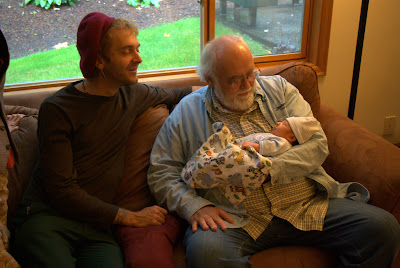For some years, I've been interested in studying "how we know things". In philosophical circles this is known as epistemology, though it has a somewhat more practical cousin called cognitive science. The whole discipline is wonderfully circular, since nearly the first question you have to ask yourself is, "How do I know that I know how we know?"
Over the last half century or so, there's been a growing consensus (though certainly not unchallenged) that most knowledge has a social or communal dimension to it. Some people even say that all knowledge-claims are socially constructed, or that any claim to knowledge is really just a disguised claim to power. But you don't have to go that far to recognize that most questions humans are interested in presuppose a plurality of humans asking the question. Still, while acts of knowledge must always take place against a backdrop of community, if knowledge is to be counted as real knowledge, in the end it must bump up against real things. Knowledge that is accessible only to a special community (whether that community be Marxists or Mormons or bloggers) will not last. Lasting knowledge both forms and is formed by a given community, but it must also reach out beyond the original bounds of that community.
One of the interesting ways in which this epistemological consensus has taken form is on the Internet. It's variously called "web 2.0", or "wikinomics" or "the wisdom of crowds," but the phenomenon described is roughly the same: using a widespread community and mass collaboration to generate knowledge. Wikipedia is probably the best-known example, but the same process takes place on thousands of forums, hundreds of thousands of blogs, and millions of email exchanges each day. People contribute what they know to a vast pool of information, and eventually, out of that sometimes maddening cacophony, consensus arises, conclusions are drawn, and very occasionally, work gets done.
I should state for the record that as a blogger and Wikipedia junky, I'm a huge fan of this, what I'll call "socially generated knowledge." It's wonderfully astonishing how well it often works. When I want to research a company, or need to understand an algorithm or mathematical concept better, my first stop is always Wikipedia; and I spend more time than my wife would like either reading blogs or contributing my own postings.
But my experience over the last several years has also brought home, quite clearly, some of the problems inherent with using mass collaboration to generate knowledge. In particular, one debate to which I've had a front-row seat illustrates quite clearly some of its limitations.
A great deal has been written about Zango in various online forums. Over time, a consensus has emerged about what Zango's software does, the value that it adds (or doesn't add), how it is generally installed on your machine, and how it is best uninstalled. In other words, this Consensus (it deserves the capital letter) can reasonably be claimed to represent the result of a wide-ranging, "web 2.0," communal search for understanding: socially generated knowledge at its most robust.
Here's the part that's interesting to me. When it comes to these issues, I sit in a rather privileged position, having supervised, designed or written a great deal of Zango's software myself. I actually know first-hand what Zango's software does, how it's installed, and how best to uninstall it. When it comes to knowing how Zango's software works, it's not a matter of community knowledge: I was there, elbow-deep in code, strategic decisions, debugging and implementation. And thus I happen to know from direct experience that much of the Consensus is simply wrong. And that's worrisome.
To put what I'm going to say into context, you have to understand that you've always been able to uninstall any of Zango's software by going to Add/Remove Programs. The steps you follow once you get to Add/Remove Programs have changed over the years, and we've simplified and standardized the process – but it has always been the case that if you go to Add/Remove Programs and you follow your nose, Zango will uninstall cleanly. (I encourage you to try it yourself, if you're so persuaded.) Furthermore, this is not only one possible way to uninstall Zango: it's without a doubt the easiest, and by a long, long shot, the safest. If you try to uninstall any modern application manually (by deleting files, registry keys, etc.), you run a fairly reasonable risk of screwing up your PC; and while a $30 scanning application is probably more thorough than doing it by hand, even they often fail to uninstall Zango completely or cleanly. They just don't know Zango's software as well as Zango's own engineers do. So that's the undeniable state of affairs: if you want to uninstall Zango, go to Add/Remove Programs. Period.
But to put it gently, that's not the impression you would get from a Google search on, say, "delete Zango". To show you what I mean, let's do just that, and take a look at the information out there about uninstalling Zango. This thread is typical of what you'll see:
Zango. What is it?
by Y4 - 7/8/04 9:30 AM
Hi,
None of my spyware programs detected Zango.exe on my PC. This program loaded on my PC covertly. Completely unwanted....Desktop short-cut, and all. However, when I ran a McAfee scan it detected Zango as a potentially unwanted application, and listed it as a variant of "180solutions", known spyware! It even comes with an installer, that will reload the program onto your computer if deleted from "Add/Remove programs". The only program that detected it, and removed it successfully was McAfee. Has anyone else ever had the "Zango experience"? What the heck is it? |
I suppose you'll have to take my word that much of what the posting describes is simply not true. Yet the contention that Zango reinstalls itself is posted as fact on numerous public forums, where it becomes the source for much additional "knowledge", and with the help of Google is referenced explicitly or implicitly by many subsequent posters.
This posting, from the same thread, similarly contains a great deal of misinformation:
Re: Zango. What is it?
by Y4 - 7/8/04 10:04 AM
In reply to: Re: Zango. What is it? by Marianna Schmudlach
Marianna, I ran Adaware, and spybot on my PC. Adaware recognised the Zango.exe, but could not remove it. I tried removing it at start-up, but to no avail. I then ran spybotS&D, it too recognised the 180solutions variant Zango.exe., and removed it successfully, however, it failed to recognise the Zango installer, and at next boot-up, BAM! There it was again! That's when I ran McAfee8, and it detected, and removed both Zango.exe, and the Zango installer. My PC is now free of the pest. This pest is a tricky one. I've done a little research on it, and from what I've found....it tries to HiJack your explore.exe, and iexplore.exe applications. If the HiJack is successful, you would in turn delete your browser application if you delete Zango from "Add/Remove programs". This, in my opinion, is spyware nearing virus potential! BEWARE!!Thank you for your attention in this matter. |
I can't swear that the scanning apps referenced didn't behave that way, because I didn't design them and I can't tell you for a fact what they can or can't do. (Though I do know that once they start messing around with a Zango installation, all bets are off as to whether Zango will still be able to uninstall itself correctly. We can write all the uninstall code we want, but if a scanning app removes that code, we have precious few options left.) But the post is most interesting to me in an epistemological sense for a different reason. The writer claims to have done "a little research", i.e., has drunk at the well of socially generated knowledge. I'm in a position to know that it's precisely this received knowledge which is most baldly inaccurate, and leads finally to the amusing (and completely untrue) claim that uninstalling Zango will delete your browser.
And so it goes. Forum postings like these are to be found everywere, but blog postings that encourage painfully manual uninstalls are common as well. Most egregious are the official-looking postings from various online security companies which insist (explicitly or implicitly) that Zango can only be safely uninstalled by shelling out $30 for their product.
To be fair, over the last year or so, some postings (here, here and here, for instance) do recognize that the best way to uninstall Zango is to go to Add/Remove Programs. Given that the process these posts describe is not only the right process, but also the cheapest and easiest by several orders of magnitude, it's rather astonishing how few and far between those posts are, and how long it's taken them to start showing up. And perhaps most troubling, despite quite a bit of searching, I have yet to find any post that explicitly corrects the Consensus. Nobody ever says, "Nah, you don't have to spend all that money, and you don't have to spend an hour mucking about with your registry. Just find Add/Remove Programs and follow your nose." Even those contributors who apparently know better don't seem to mind that the Consensus is quite wrong, and that's quite puzzling.
At some level, this rather shocking discord between reality and the Consensus calls into question the reliability of the entire "web 2.0" project. (Though please note that I explain "web 2.0" with a reference to the archetypal web 2.0 site – who said irony is dead?) In further postings, I'd like to explore the reasons why so much that is said about Zango is so inaccurate – and see if that can help us to understand better the strengths and limitations of socially generated knowledge.












